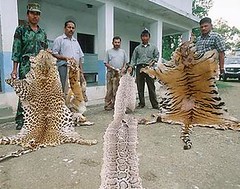 來自南亞全境7個國家的野生動物專家近日成立了「南亞野生動植物執法網絡」(South Asia Wildlife Enforcement Network, SAWEN),這個網絡將用來在區域間協調應變方式,阻止諸如老虎、豹與熊這些物種的非法盜獵與交易。
來自南亞全境7個國家的野生動物專家近日成立了「南亞野生動植物執法網絡」(South Asia Wildlife Enforcement Network, SAWEN),這個網絡將用來在區域間協調應變方式,阻止諸如老虎、豹與熊這些物種的非法盜獵與交易。
針對非法野生動植物貿易的南亞專家小組首次會議於19日做出決議,同意為此新組織成立秘書處並擬定大致的工作方案。
來自阿富汗、孟加拉、不丹、印度、尼泊爾、巴基斯坦與斯里蘭卡的專家共同商定南亞野生動植物執法網絡的架構、功能與運作規範。
尼泊爾的部長森林和土地保育部長波哈拉(Deepak Bohara)表示:「政府機構之間合作與協調且獲得其國際夥伴的支持,對於有效打擊此區域非法野生動植物交易而言,至關重要。」
尼泊爾政府已表示爭取作為南亞野生動植物執法網絡總部所在地,並暫時擔任協調單位。
為了協助各野生動植物執法機構能比犯罪份子更加具備組織性,專家小組一致認為,在新成立的網絡下,應儘快貫徹以行動為導向的策略。
在未來 6個月,尼泊爾協調單位將彙整資訊、確認資源,而來自會員國的專家將研擬共同運作與訓練方案、溝通計畫,並進行募款,使這個網絡能夠開始阻絕野生動植物走私行為。
南亞地區含有部分具備全球重要性的棲地,孕育著一些獨特的動植物物種,如老虎與其他亞洲大型貓科動物、犀牛、海龜與淡水龜,以及穿山甲。如此豐富的生物多樣性使得這個地區成為野生動植物偷獵者與非法交易商的標的。
儘管南亞各國政府信守承諾,嚴正投入其動物與植物的保育,但與會者都承認,生物多樣性所面臨的諸多威脅乃是跨越政治邊境的。
對於野生動植物物種進行非法與不永續的盜獵、採集與貿易,往往攸關著跨國界的地景與棲地,並與民眾及貨物在疏於防守的邊界之間跨越移動相關。野生動植物貿易調查委員會(TRAFFIC International)表示,有組織的犯罪集團不會侷限在單一個國家活動,這是愈來愈顯著的特色。
ildlife experts from seven nations across South Asia have laid the foundation for a South Asia Wildlife Enforcement Network that will serve as a coordinated regional response to illegal poaching and trafficking of such species as tigers, leopards and bears.
The first meeting of the South Asia Experts Group on Illegal Wildlife Trade concluded here Wednesday with an agreement to establish a secretariat and an outline work program for the new organization.
The experts from Afghanistan, Bangladesh, Bhutan, India, Nepal, Pakistan and Sri Lanka agreed the structure, functions and operational parameters for the South Asia Wildlife Enforcement Network, SAWEN.
"Cooperation and coordination between the government agencies supported by their international counterparts is of utmost importance to effectively tackle illegal wildlife trade in the region," said Deepak Bohara, Nepal's Minister for Forest and Soil Conservation.
The government of Nepal has offered to host the South Asia Wildlife Enforcement Network and act as its interim coordinator.
Aiming to help wildlife law enforcement agencies become better organized than the criminals, the Experts Group agreed that an action oriented approach under the newly formed network should be pursued without delay.
Over the next six months, Nepalese coordinators will assemble information and identify resources and expertise from member countries to develop joint operations, training programs, communication plans and fundraising to enable the network to begin interdicting wildlife trafficking activities.
South Asia contains a range of habitats of global significance that support a unique array of animal and plant species such as tigers and other Asian big cats, rhinos, marine and freshwater turtles and pangolins. This richness of biodiversity makes the region a target for wildlife poachers and traffickers.
While national governments in South Asia take their commitments to conserve their animals and plants seriously, meeting participants all acknowledged that many of the threats to biodiversity extend beyond political boundaries.
Illegal and unsustainable poaching, harvest and trade in wild species of animals and plants often involves transboundary landscapes and habitats and movements of people and goods across porous borders. It is increasingly characterized by organized criminal syndicates working in more than one country, says TRAFFIC International.


